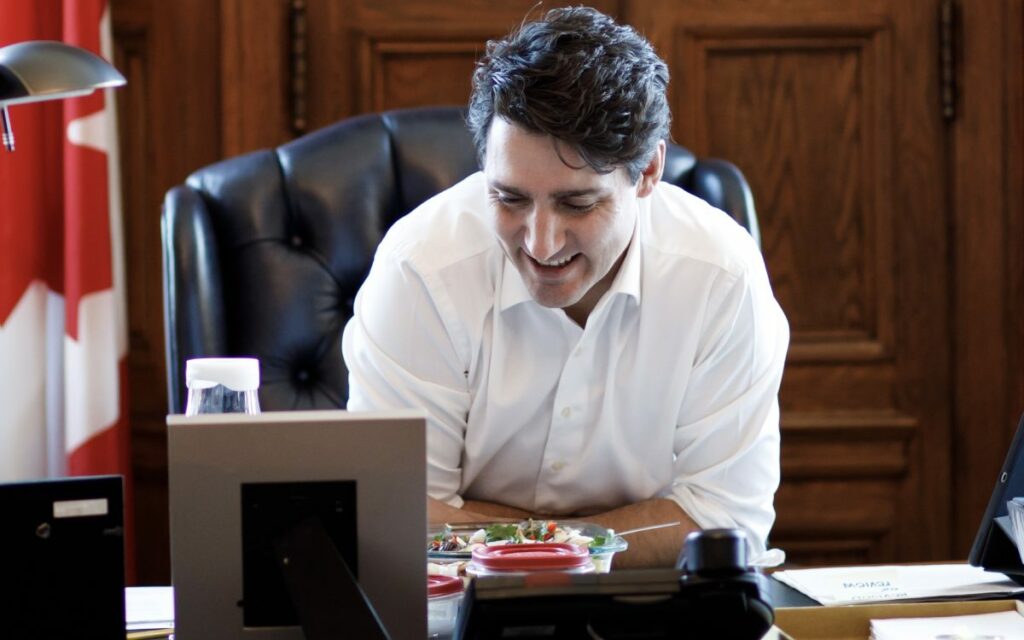
There would be 72,491 fewer federal paper pushers had Trudeau kept growth in the bureaucracy in line with population growth. Pictured: Prime Minister Justin Trudeau. Photo Credit: Justin Trudeau/X.
Taxpayers know we’re paying for too many paper pushers in the federal government.
A Leger poll commissioned by the Canadian Taxpayers Federation shows a plurality of Canadians want to shrink Ottawa’s bureaucracy.
The poll shows 47 per cent of Canadians want to reduce the number of federal bureaucrats. Less than three-in-ten Canadians want to maintain the current number of federal employees.
Only seven per cent of Canadians think the federal government should hire more bureaucrats. The rest were unsure.
Canadians are right, the federal government is bloated under Prime Minister Justin Trudeau.
Since Trudeau took office in 2015, his government added 108,793 bureaucrats, bringing the total up to 367,772 federal employees. That’s a 42 per cent increase in less than a decade. Canada’s population only grew by 14 per cent during that time.
There would be 72,491 fewer federal paper pushers had Trudeau kept growth in the bureaucracy in line with population growth.
The average annual compensation for full-time federal bureaucrats is $125,300, when pay, pension, and other perks are accounted for, according to the Parliamentary Budget Officer.
That means 72,000 excess bureaucrats cost taxpayers roughly $9 billion per year. That’s the same amount of money as cutting the first two income tax rates by a percentage point.
The Leger poll also broke down results based on Canadians’ voting intentions.
Seventy-one per cent of Conservative voters want to shrink the federal bureaucracy.
This has big implications.
Polls show the Conservatives are poised to form the next government. Their supporters expect them to shrink Ottawa’s bureaucracy.
“The government does not have a revenue problem, they have a spending problem,” Conservative Party Leader Pierre Poilievre said. “They have nearly doubled government spending in a decade [and they’ve] added about 50 per cent more bureaucrats.”
Poilievre promises to “fix the budget and bring Canadians the relief they desperately need.” His ability to deliver on that promise will be directly tied to his ability to shrink the bureaucracy.
That’s because the bureaucracy consumes more than half of the federal government’s day-to-day spending. There is no fixing the budget without cutting the cost of the bureaucracy.
Along with reducing the number of federal paper pushers, Poilievre should also rein in pay and perks.
Trudeau handed out more than one million pay raises in the last four years alone. If Poilievre is going to end bureaucrat pay raises, he should first commit to ending the pay raises MPs give themselves every year.
Before going on strike last year, federal government unions pointed to “the yearly salary increases of senators and member of Parliament” as a reason bureaucrats should be given more taxpayer cash.
Showing leadership and a willingness to rein in MP pay will go a long way in helping politicians rein in the bureaucracy. In fact, the Harper government showed it would “lead by example” as it froze MP pay between 2010 and 2013.
The government must also stop rewarding failure with taxpayer-funded bonuses. The feds rubberstamped more than $1.5 billion in bonuses since 2015.
Ottawa’s bonuses keep flowing despite the PBO finding “less than 50 per cent of [performance] targets are consistently met.”
Poilievre knows this is a problem. He said he would “cancel bonuses for failing government authorities and that would include, for example, the Bank of Canada and the CBC.”
Here’s the bottom line: taxpayers pay for too many federal paper pushers. Any politician that wants to fix the budget and cut taxes must shrink the federal bureaucracy.
Franco Terrazzano is the Federal Director of the Canadian Taxpayers Federation
Franco Terrazzano is the Alberta Director for the Canadian Taxpayers Federation.






